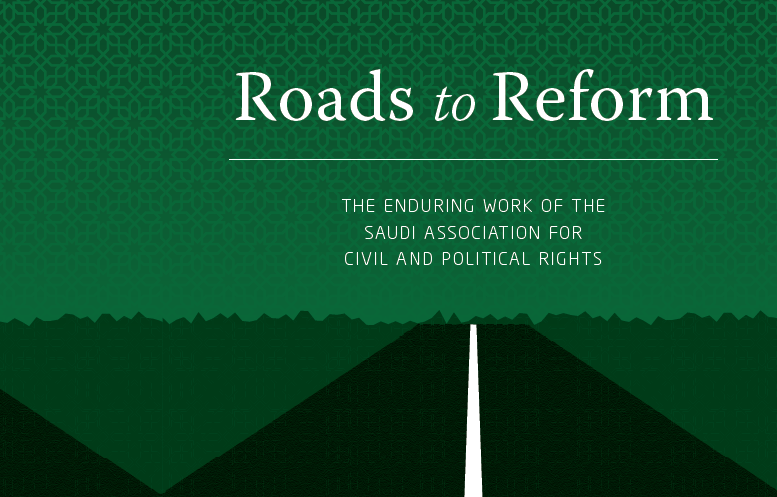Americans for Democracy & Human Rights in Bahrain (ADHRB) is pleased to announce our new report, Roads to Reform: The Enduring Work of the Saudi Association for Civil and Political Rights. See the introduction below, and click here for the full report.
In October 2009, 15 activists from across the kingdom of Saudi Arabia established the Saudi Association for Civil and Political Rights (ACPRA).1 Until the government shut down the organization in 2013 and imprisoned its founders, ACPRA worked to document human rights violations in the kingdom while simultaneously articulating a broad vision for civil and constitutional reform in Saudi Arabia. ACPRA was not the first human rights group in Saudi Arabia to advocate for constitutional reform and a more open civil society. However, the principles on which ACPRA based its case for peaceful change and the ways in which it captivated a new generation of Saudi activists represent an important development in the reform movement in Saudi Arabia that those invested in a more democratic Saudi Arabia should examine. ACPRA successfully invigorated a discourse on political rights, equality and pluralism anchored in universal principles and Islamic sources relevant to Saudi society. It also drew upon the power of social media to effectively transform the state’s prosecution of its two most prominent members into a vehicle for spreading its ideas and galvanizing support among Saudi citizens.
In this report, Roads to Reform: The Enduring Work of the Saudi Association for Civil and Political Rights, ADHRB examines the contributions of ACPRA within the larger context of the movement for civil and political reform in Saudi Arabia. Chapter One discusses the rise of the political opposition movement in Saudi Arabia, beginning with the period of widespread dissent in response to the first Gulf War. It explains how the experience of Saudi reformers from the 1990s shaped the causes and demands ACPRA would later advocate for, and outlines the historical challenges that the reform efforts in Saudi Arabia has faced from both government suppression and internal divisions. Chapter Two chronicles the establishment of ACPRA, its advocacy efforts and work on behalf of detainees, and its eventual persecution and demise at the hands of the state. Chapter Three explores the principal objectives of ACPRA and its supporters: combating human rights violations, and promoting human rights awareness, political representation in the form of a constitutional monarchy, and an open civil society. This chapter explains how ACPRA members rooted these objectives, long regarded as essential features of modern democracies, in Islamic concepts and texts, and in so doing laid a foundation for political reform compatible with Saudi Arabia’s traditional religious character. Chapter Three also documents ACPRA’s strategic use of social media in connection with the trial of the organization’s leaders. In its final chapter, the report offers recommendations on how and why the United States should support the efforts of organizations and civil society activists like ACPRA and its members to bring about peaceful political and civil reform. It suggests that the unveiling of Saudi Arabia’s new economic development initiative, Saudi Vision 2030, which explicitly emphasizes the country’s need for a more engaged and invigorated Saudi citizenry, makes this an opportune time for U.S. leaders to encourage a more active Saudi civil society.
As new waves of authoritarianism and instability emerge in the Middle East in the aftermath of the Arab Spring, those who strive to secure democratic reform and counter violent extremism should examine and support human rights organizations whose advocacy efforts hold the greatest promise for peaceful change. In this light, this report serves to illuminate ACPRA’s powerful vision for advancing reform and its unique contributions to this effort.
For the full report, please click here.





